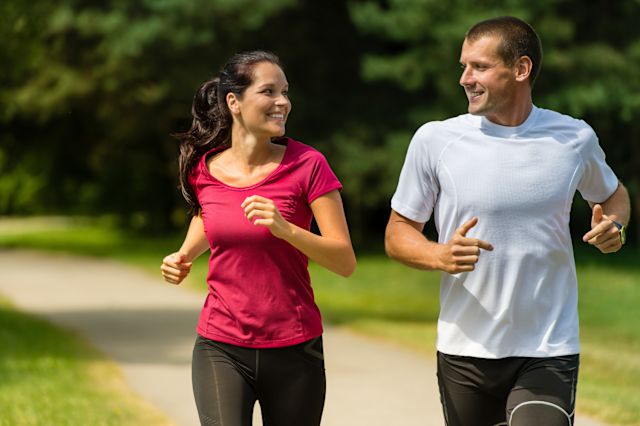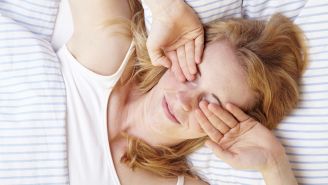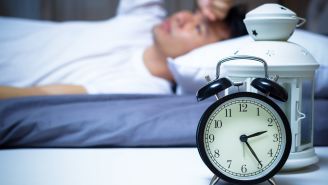Updated on September 30, 2024.
If you’re having trouble sleeping, getting more exercise may help.
Research has shown people with insomnia or difficulty sleeping may sleep better by getting active each day—and it may even help about as much as sleeping pills.
A 2024 study published in the British Medical Journal followed more than 4,000 participants over 10 years, tracking any insomnia symptoms, how long they slept, and their physical activity levels. They found that the participants who were most active were about 40 percent less likely to have trouble falling asleep, and 29 percent and 47 percent less likely to sleep too short (six hours or less) or too long (nine hours or more), respectively.
These likelihoods were true even after the researchers took into account the age, sex, weight, and smoking history of the participants. It seems clear that exercise may be a powerful sleep aid.
Something about sweat
While any type of safe exercise is going to contribute to your overall health, when it comes to improving your sleep, researchers have found that moderate aerobic exercise is the key.
Aerobic exercise makes you breathe faster and gets your heart rate up.
A 2023 systematic review published in the journal Cureus examined 23 different studies that looked at the relationship between sleep and exercise. They found that the evidence points to moderate exercise, rather than low- or high-intensity exercise, as being best. Studies showed that moderate-intensity exercise was tied to better sleep quality, while vigorous exercise was tied to poor sleep quality and difficulty falling asleep.
To check if you’re exercising moderately (rather than vigorously), make sure your heart rate is faster and you’re breathing harder than usual, but that you can still carry on a conversation without being completely out of breath.
Why moderate exercise helps you sleep
There are many ways in which moderate-intensity exercise interacts with the different systems in your body to help you fall asleep—and stay asleep. When you exercise, your body releases endorphins, which are hormones that can relieve stress, lower pain, and improve your mood. Exercise also helps stimulate your brain to release neurotransmitters like serotonin and norepinephrine, which help you to both relax and to regulate your mood.
Relaxation can help lower your body temperature and regulate your circadian rhythms, ultimately helping you fall asleep sooner, stay asleep longer, and have fewer nighttime awakenings.
However, high-intensity exercise seems to do the opposite, making it harder to fall asleep, and raising the risk of sleep disruptions (wakeups). This is especially true for vigorous exercise done three hours before bedtime.
How to get the most benefit
There is no single exercise formula that will work for everyone experiencing sleep issues. Still, in addition to moderate intensity being better for sleep, there is plenty of research suggesting what may be the best times of day, amounts, and frequency of exercise.
Avoid evenings
For most people, exercising in the mornings or afternoons seems to be much more helpful than nighttime physical activity.
Choose moderate types of exercise
The exercises that show up as most helpful for sleep fall into a few categories, but the key is to do them at a moderate level. Here are some great options for moderate exercise:
- Moderate-intensity aerobic exercises like brisk walking, dancing, biking, tennis, or water aerobics
- Household activities like gardening or stair climbing
- Moderate-intensity muscle-strengthening exercises using resistance bands or weights
If you have mobility issues or a chronic condition, talk with your healthcare provider (HCP) for recommendations about which types of exercises would be most helpful for you. In the meantime, work on moving your body in whatever ways you’re able. You might try seated yoga or chair stretches. The most important thing is to move and not sit still.
Be consistent
Follow the recommended guidelines from the Centers for Disease Control and Prevention: Aim for at least 150 minutes (2.5 hours) per week of moderate-intensity aerobic exercises that get your heart rate up. Getting 300 active minutes (5 hours) each week is even more ideal. Be as consistent as you can—stay regularly active.
Start where you are
If you can’t reach 150 minutes per week, don’t give up before you’ve begun. Instead, focus on starting where you are. If you need to start with 10 minutes a day of exercise, that’s great—research has shown that any level of activity is better than none.
Start with your current level of fitness and set small, achievable goals for yourself. Don’t forget to celebrate when you reach a goal—it’s important to reward yourself in a healthy way for making these changes and sticking to your plan.







